- Home
- E. M. Forster
Aspects of the Novel
Aspects of the Novel Read online
Aspects of the Novel
E. M. Forster
Copyright
Aspects of the Novel
Copyright © 1927 by E. M. Forster
Cover art to the electronic edition copyright © 2002 by RosettaBooks, LLC
All rights reserved. No part of this book may be used or reproduced in any manner whatsoever without written permission except in the case of brief quotations embodied in critical articles and reviews.
Electronic editions published 2002, 2010 by RosettaBooks LLC, New York.
ISBN Mobipocket edition: 9780795309564
Contents
Chapter 1 INTRODUCTORY
Chapter 2 THE STORY
Chapter 3 PEOPLE
Chapter 4 PEOPLE (Continued)
Chapter 5 THE PLOT
Chapter 6 FANTASY
Chapter 7 PROPHECY
Chapter 8 PATTERN AND RHYTHM
Chapter 9 CONCLUSION
Index
I
INTRODUCTORY
THIS lectureship is connected with the name of William George Clark, a fellow of Trinity. It is through him we meet today, and through him we shall approach our subject.
Clark was, I believe, a Yorkshireman. He was born in 1821, was at school at Sedbergh and Shrewsbury, entered Trinity as an undergraduate in 1840, became fellow four years later, and made the college his home for nearly thirty years, only leaving it when his health broke, shortly before his death. He is best known as a Shakespearian scholar, but he published two books on other subjects to which we must here refer. He went as a young man to Spain and wrote a pleasant lively account of his holiday called Gazpacho: Gazpacho being the name of a certain cold soup which he ate and appears to have enjoyed among the peasants of Andalusia: indeed he appears to have enjoyed everything. Eight years later, as a result of a holiday in Greece, he published a second book, Peloponnesus. Peloponnesus is a graver work and a duller. Greece was a serious place in those days, more serious than Spain, besides, Clark had by now not only taken Orders but become Public Orator, and he was, above all, travelling with Dr. Thompson, the then Master of the college, who was not at all the sort of person to be involved in a cold soup. The jests about mules and fleas are consequently few, and we are increasingly confronted with the remains of Classical Antiquity and the sites of battles. What survives in the book—apart from its learning—is its feeling for Greek country-side. Clark also travelled in Italy and Poland.
To turn to his academic career. He planned the great Cambridge Shakespeare, first with Glover, then with Aldis Wright (both librarians of Trinity), and, helped by Aldis Wright, he issued the Globe Shakespeare, a popular text. He collected much material for an edition of Aristophanes. He also published some Sermons, but in 1869 he gave up Holy Orders—which, by the way, will exempt us from excessive orthodoxy. Like his friend and biographer Leslie Stephen, like Henry Sidgwick and others of that generation, he did not find it possible to remain in the Church, and he has explained his reasons in a pamphlet entitled The Present Dangers of the Church of England. He resigned his post of Public Orator in consequence, while retaining his college tutorship. He died at the age of fifty-seven, esteemed by all who knew him as a lovable, scholarly and honest man. You will have realized that he is a Cambridge figure. Not a figure in the great world or even at Oxford, but a spirit peculiar to these courts, which perhaps only you who tread them after him can justly appreciate: the spirit of integrity. Out of a bequest in his will, his old college has provided for a series of lectures, to be delivered annually “on some period or periods of English Literature not earlier than Chaucer,” and that is why we meet here now.
Invocations are out of fashion, yet I wanted to make this small one, for two reasons. Firstly, may a little of Clark’s integrity be with us through this course; and secondly, may he accord us a little inattention! For I am not keeping quite strictly to the terms laid down—”Period or periods of English Literature.” This condition, though it sounds liberal and is liberal enough in spirit, happens verbally not quite to suit our subject, and I shall occupy the introductory lecture in explaining why this is. The points raised may seem trivial. But they will lead us to a convenient vantage post from which we can begin our main attack next week.
We need a vantage post, for the novel is a formidable mass, and it is so amorphous—no mountain in it to climb, no Parnassus or Helicon, not even a Pisgah. It is most distinctly one of the moister areas of literature—irrigated by a hundred rills and occasionally degenerating into a swamp. I do not wonder that the poets despise it, though they sometimes find themselves in it by accident. And I am not surprised at the annoyance of the historians when by accident it finds itself among them. Perhaps we ought to define what a novel is before starting. This will not take a second. M. Abel Chevalley has, in his brilliant little manual,* provided a definition, and if a French critic cannot define the English novel, who can? It is, he says, “a fiction in prose of a certain extent” (une fiction en prose d’une certaine étendue). That is quite good enough for us, and we may perhaps go so far as to add that the extent should not be less than 50,000 words. Any fictitious prose work over 50,000 words will be a novel for the purposes of these lectures, and if this seems to you unphilosophic will you think of an alternative definition, which will include The Pilgrim’s Progress, Marius the Epicurean, The Adventures of a Younger Son, The Magic Flute, The Journal of the Plague, Zuleika Dobson, Rasselas, Ulysses, and Green Mansions, or else will give reasons for their exclusion? Parts of our spongy tract seem more fictitious than other parts, it is true: near the middle, on a tump of grass, stand Miss Austen with the figure of Emma by her side, and Thackeray holding up Esmond. But no intelligent remark known to me will define the tract as a whole. All we can say of it is that it is bounded by two chains of mountains neither of which rises very abruptly—the opposing ranges of Poetry and of History—and bounded on the third side by a sea—a sea that we shall encounter when we come to Moby Dick.
Let us begin by considering the proviso “English Literature.” “English” we shall of course interpret as written in English, not as published south of the Tweed or east of the Atlantic, or north of the Equator: we need not attend to geographical accidents, they can be left to the politicians. Yet, even with this interpretation, are we as free as we wish? Can we, while discussing English fiction, quite ignore fiction written in other languages, particularly French and Russian? As far as influence goes, we could ignore it, for our writers have never been much influenced by the continentals. But—for reasons soon to be explained—I want to talk as little as possible about influence during these lectures. My subject is a particular kind of book and the aspects that book has assumed in English. Can we ignore its collateral aspects on the continent? Not entirely. An unpleasant and unpatriotic truth has here to be faced. No English novelist is as great as Tolstoy—that is to say has given so complete a picture of man’s life, both on its domestic and heroic side. No English novelist has explored man’s soul as deeply as Dostoevsky. And no novelist anywhere has analysed the modern consciousness as successfully as Marcel Proust. Before these triumphs we must pause. English poetry fears no one—excels in quality as well as quantity. But English fiction is less triumphant: it does not contain the best stuff yet written, and if we deny this we become guilty of provincialism.
Now, provincialism does not signify in a writer, and may indeed be the chief source of his strength: only a prig or a fool would complain that Defoe is cockneyfied or Thomas Hardy countrified. But provincialism in a critic is a serious fault. A critic has no right to the narrowness which is the frequent prerogative of the creative artist. He has to have a wide outlook or he has not anything at all. Although the novel exercises the rights of a created object, critic
ism has not those rights, and too many little mansions in English fiction have been acclaimed to their own detriment as important edifices. Take four at random: Cranford, The Heart of Midlothian, Jane Eyre, Richard Feverel. For various personal and local reasons we may be attached to these four books. Cranford radiates the humour of the urban midlands, Midlothian is a handful out of Edinburgh, Jane Eyre is the passionate dream of a fine but still undeveloped woman. Richard Feverel exudes farmhouse lyricism and flickers with modish wit, but all four are little mansions, not mighty edifices, and we shall see and respect them for what they are if we stand them for an instant in the colonnades of War and Peace, or the vaults of The Brothers Karamazov.
I shall not often refer to foreign novels in these lectures, still less would I pose as an expert on them who is debarred from discussing them by his terms of reference. But I do want to emphasize their greatness before we start; to cast, so to speak, this preliminary shadow over our subject, so that when we look back on it at the end we may have the better chance of seeing it in its true lights.
So much for the proviso “English.” Now for a more important proviso, that of “period or periods.” This idea of a period of a development in time, with its consequent emphasis on influences and schools, happens to be exactly what I am hoping to avoid during our brief survey, and I believe that the author of Gazpacho will be lenient. Time, all the way through, is to be our enemy. We are to visualize the English novelists not as floating down that stream which bears all its sons away unless they are careful, but as seated together in a room, a circular room, a sort of British Museum reading-room—all writing their novels simultaneously. They do not, as they sit there, think “I live under Queen Victoria, I under Anne, I carry on the tradition of Trollope, I am reacting against Aldous Huxley.” The fact that their pens are in their hands is far more vivid to them. They are half mesmerized, their sorrows and joys are pouring out through the ink, they are approximated by the act of creation, and when Professor Oliver Elton says, as he does, that “after 1847 the novel of passion was never to be the same again,” none of them understand what he means. That is to be our vision of them—an imperfect vision, but it is suited to our powers, it will preserve us from a serious danger, the danger of pseudo-scholarship.
Genuine scholarship is one of the highest successes which our race can achieve. No one is more triumphant than the man who chooses a worthy subject and masters all its facts and the leading facts of the subjects neighbouring. He can then do what he likes. He can, if his subject is the novel, lecture on it chronologically if he wishes because he has read all the important novels of the past four centuries, many of the unimportant ones, and has adequate knowledge of any collateral facts that bear upon English fiction. The late Sir Walter Raleigh (who once held this lectureship) was such a scholar. Raleigh knew so many facts that he was able to proceed to influences, and his monograph on the English novel adopts the treatment by period which his unworthy successor must avoid. The scholar, like the philosopher, can contemplate the river of time. He contemplates it not as a whole, but he can see the facts, the personalities, floating past him, and estimate the relations between them, and if his conclusions could be as valuable to us as they are to himself he would long ago have civilized the human race. As you know, he has failed. True scholarship is incommunicable, true scholars rare. There are a few scholars, actual or potential, in the audience today, but only a few, and there is certainly none on the platform. Most of us are pseudo-scholars, and I want to consider our characteristics with sympathy and respect, for we are a very large and quite a powerful class, eminent in Church and State, we control the education of the Empire, we lend to the Press such distinction as it consents to receive, and we are a welcome asset at dinner-parties.
Pseudo-scholarship is, on its good side, the homage paid by ignorance to learning. It also has an economic side, on which we need not be hard. Most of us must get a job before thirty, or sponge on our relatives, and many jobs can only be got by passing an exam. The pseudo-scholar often does well in examination (real scholars are not much good), and even when he fails he appreciates their innate majesty. They are gateways to employment, they have power to ban and bless. A paper on King Lear may lead somewhere, unlike the rather far-fetched play of the same name. It may be a stepping-stone to the Local Government Board. He does not often put it to himself openly and say “That’s the use of knowing things, they help you to get on.” The economic pressure he feels is more often subconscious, and he goes to his exam, merely feeling that a paper on King Lear is a very tempestuous and terrible experience but an intensely real one. And whether he be cynical or naïf, he is not to be blamed. As long as learning is connected with earning, as long as certain jobs can only be reached through exams, so long must we take the examination system seriously. If another ladder to employment was contrived, much so-called education would disappear, and no one be a penny the stupider.
It is when he comes to criticism—to a job like the present—that he can be so pernicious, because he follows the method of a true scholar without having his equipment. He classes books before he has understood or read them; that is his first crime. Classification by chronology. Books written before 1847, books written after it, books written after or before 1848. The novel in the reign of Queen Anne, the pre-novel, the ur-novel, the novel of the future. Classification by subject matter—sillier still. The literature of Inns, beginning with Tom Jones; the literature of the Women’s Movement, beginning with Shirley; the literature of Desert Islands, from Robinson Crusoe to The Blue Lagoon; the literature of Rogues—dreariest of all, though the Open Road runs it pretty close; the literature of Sussex (perhaps the most devoted of the Home Counties); improper books—a serious though dreadful branch of enquiry, only to be pursued by pseudo-scholars of riper years, novels relating to industrialism, aviation, chiropody, the weather. I include the weather on the authority of the most amazing work on the novel that I have met for many years. It came over the Atlantic to me, nor shall I ever forget it. It was a literary manual entitled Materials and Methods of Fiction. The writer’s name shall be concealed. He was a pseudo-scholar and a good one. He classified novels by their dates, their length, their locality, their sex, their point of view, till no more seemed possible. But he still had the weather up his sleeve, and when he brought it out, it had nine heads. He gave an example under each head, for he was anything but slovenly, and we will run through his list. In the first place the weather can be “decorative,” as in Pierre Loti; then “utilitarian,” as in The Mill on the Floss (no Floss, no Mill; no Mill, no Tullivers); “illustrative,” as in The Egoist; “planned in pre-established harmony,” as by Fiona MacLeod; “in emotional contrast,” as in The Master of Ballantrae; “determinative of action,” as in a certain Kipling story, where a man proposes to the wrong girl on account of a mud storm; “a controlling influence,” Richard Feverel; “itself a hero,” like Vesuvius in The Last Days of Pompeii; and ninethly, it can be “non-existent,” as in a nursery tale. I liked him flinging in nonexistence. It made everything so scientific and trim. But he himself remained a little dissatisfied, and having finished his classification he said yes, of course there was one more thing, and that was genius; it was useless for a novelist to know that there are nine sorts of weather, unless he has genius also. Cheered by this reflection, he classified novels by their tones. There are only two tones, personal and impersonal, and having given examples of each he grew pensive again and said, “Yes, but you must have genius too, or neither tone will profit.”
This constant reference to genius is another characteristic of the pseudo-scholar. He loves mentioning genius, because the sound of the word exempts him from trying to discover its meaning. Literature is written by geniuses. Novelists are geniuses. There we are; now let us classify them. Which he does. Everything he says may be accurate but all is useless because he is moving round books instead of through them, he either has not read them or cannot read them properly. Books have to be read (worse luck, for
it takes a long time); it is the only way of discovering what they contain. A few savage tribes eat them, but reading is the only method of assimilation revealed to the west. The reader must sit down alone and struggle with the writer, and this the pseudo-scholar will not do. He would rather relate a book to the history of its time, to events in the life of its author, to the events it describes, above all to some tendency. As soon as he can use the word “tendency” his spirits rise, and though those of his audience may sink, they often pull out their pencils at this point and make a note, under the belief that a tendency is portable.
That is why, in the rather ramshackly course that lies ahead of us, we cannot consider fiction by periods, we must not contemplate the stream of time. Another image better suits our powers: that of all the novelists writing their novels at once. They come from different ages and ranks, they have different temperaments and aims, but they all hold pens in their hands, and are in the process of creation. Let us look over their shoulders for a moment and see what they are writing. It may exorcise that demon of chronology which is at present our enemy and which (we shall discover next week) is sometimes their enemy too. “Oh, what quenchless feud is this, that Time hath with the sons of men,” cries Herman Melville, and the feud goes on not only in life and death but in the by-ways of literary creation and criticism. Let us avoid it by imagining that all the novelists are at work together in a circular room. I shall not mention their names until we have heard their words, because a name brings associations with it, dates, gossip, all the furniture of the method we are discarding.

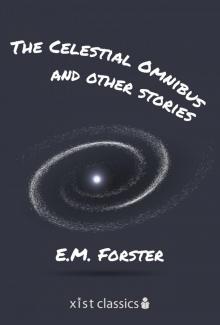 The Celestial Omnibus and Other Stories
The Celestial Omnibus and Other Stories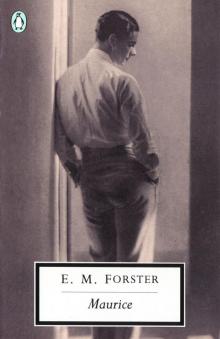 Maurice
Maurice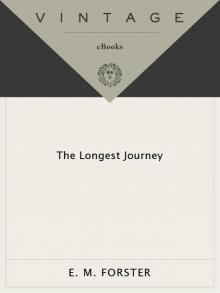 The Longest Journey
The Longest Journey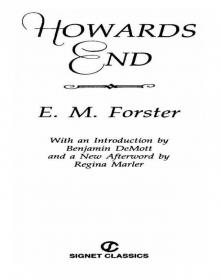 Howards End
Howards End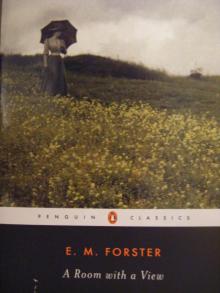 A Room with a View
A Room with a View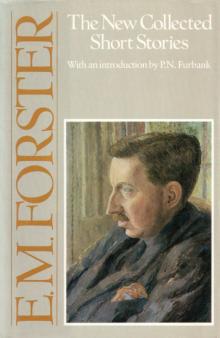 The New Collected Short Stories
The New Collected Short Stories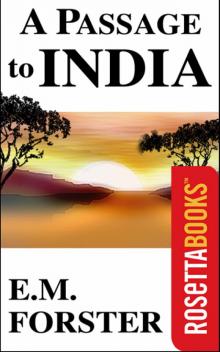 A Passage to India
A Passage to India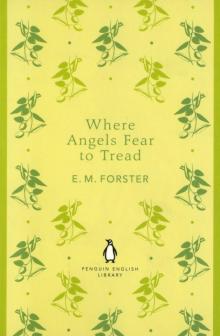 Where Angels Fear to Tread
Where Angels Fear to Tread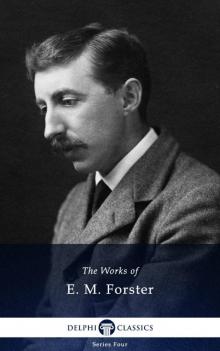 Works of E M Forster
Works of E M Forster Selected Stories
Selected Stories The Machine Stops
The Machine Stops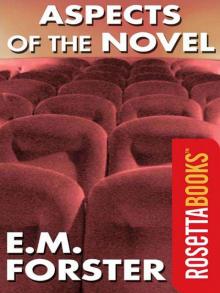 Aspects of the Novel
Aspects of the Novel